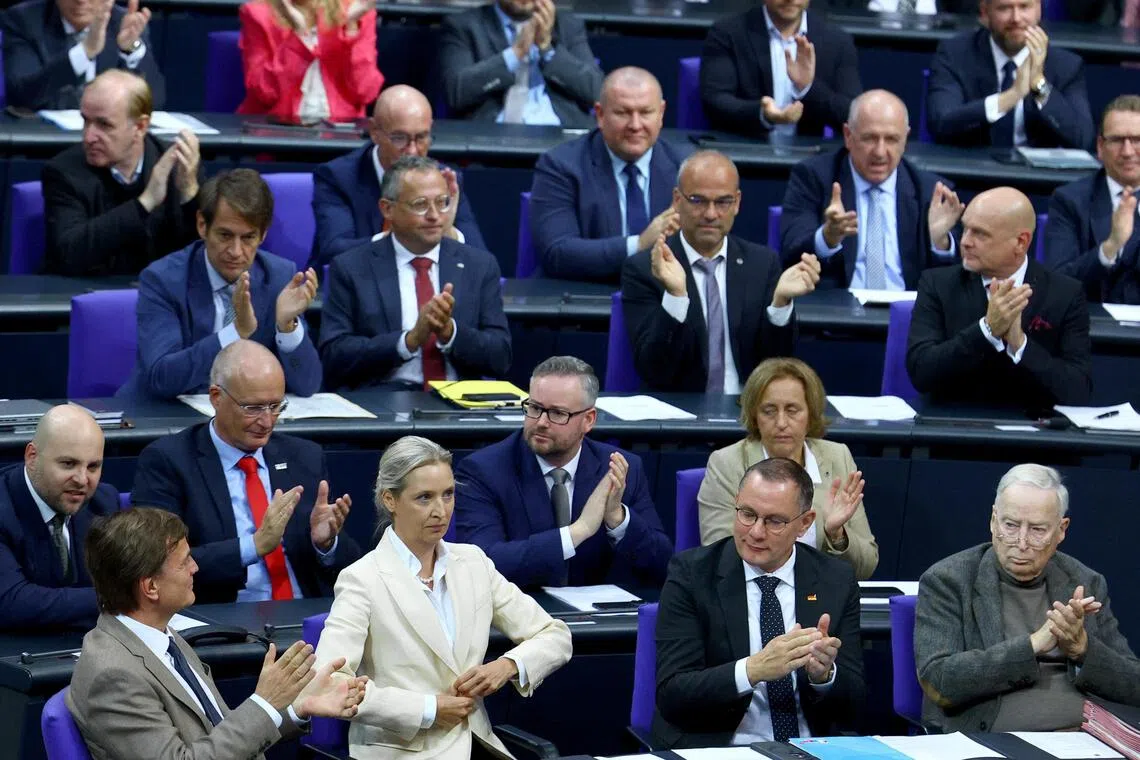Far-right German MPs to visit Russia as scrutiny of Moscow ties mounts
Sign up now: Get ST's newsletters delivered to your inbox

Alternative for Germany party members have faced criticism amid fears they could be passing information to Russia.
PHOTO: REUTERS
Follow topic:
BERLIN – Two lawmakers from the far-right Alternative for Germany (AfD) travel next week to Russia while under fire from opponents for the party’s ties to the Kremlin and accusations – strongly denied – that it could be passing on sensitive military information.
The two politicians from the AfD, Germany’s biggest opposition party, will travel to Sochi to attend a summit on cooperation between Europe and the Brics, the group of major emerging economies that includes Russia as well as Brazil, India, China and South Africa.
AfD politicians have continued to maintain contacts with Russia despite its 2022 full-scale invasion of Ukraine,
The party, which is classified as “extremist”
“I consider it my personal mission to use every legitimate democratic means of open debate to help prevent any escalation of the conflict with Russia into Nato territory and into Germany itself,” said Mr Rainer Rothfuss, one of the two parliamentarians travelling. “I shy away from neither effort nor public criticism of this form of informal peace diplomacy.”
The AfD, Germany’s most popular party in recent polls, has cast the trip as an opportunity to keep channels of dialogue open, as it has done with politicians in the US.
Mr Rothfuss is set to participate in a meeting with former Russian president Dmitry Medvedev, now deputy chairman of Russia’s Security Council, German media reported.
Mr Medvedev will not take part in the summit itself but is inviting all participants to a closed discussion the evening before, Mr Rothfuss said.
The Russian Embassy in Berlin did not immediately respond to a request for comment.
“It’s about economic issues in the Brics context – not a meeting with government officials from Moscow,” deputy AfD parliamentary leader Stefan Keuter said.
Russia accused of cultivating contacts on far left and right
The head of Germany’s domestic intelligence service last week warned Russia was trying to exert influence on German politics, trying to cultivate contacts especially on the fringes, both left and right.
This represents an attempt “to present Russian narratives in the end as more articulate and ultimately more acceptable, and to call Western democracies into question”, he told broadcaster RTL.
The trip comes after several senior German politicians from other parties have expressed concern that the party could be supplying Moscow with sensitive information.
Mr Thomas Roewekamp, chairman of the Bundestag defence committee and member of Chancellor Friedrich Merz’s conservatives, told Der Spiegel magazine that the AfD was asking “targeted, grid-like” parliamentary questions about the military.
This was the kind of “information that would be of great value to foreign powers, not least to Russia, which has been continuously increasing its espionage activities and hybrid attacks against Germany”, he said.
The AfD’s Mr Keuter defended his party’s actions to the Bundestag on Nov 5, saying it was trying to create transparency and hold those in power accountable. Accusations of treason were “a smoke grenade”, he said.
It is the opposition’s duty “to critically examine... whether government policy really strengthens our country’s security”, he said, accusing the government of strategic miscalculations regarding Russia and attempts now to deflect attention.
The halt of Russian pipeline gas after the Ukraine invasion hit Germany hard, contributing to two consecutive annual contractions in Europe’s largest economy.
The AfD has long faced scrutiny over its ties to Russia, and in 2024 prosecutors opened investigations into lawmakers Petr Bystron and Maximilian Krah over alleged foreign payments. Both deny wrongdoing. REUTERS

